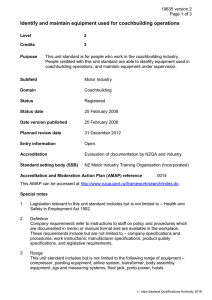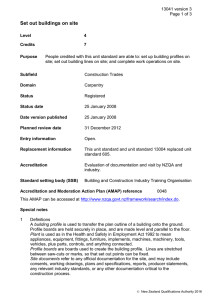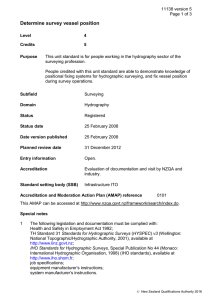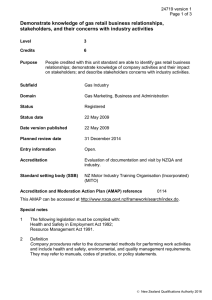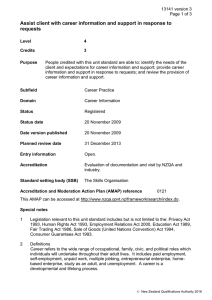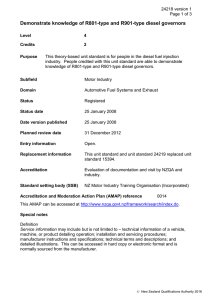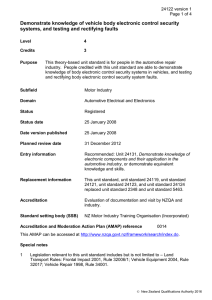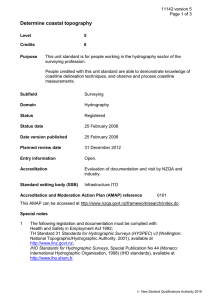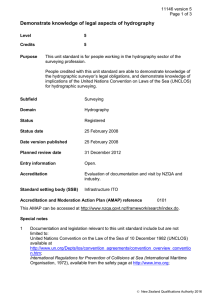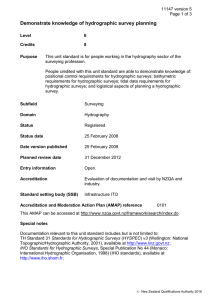Determine depth
advertisement
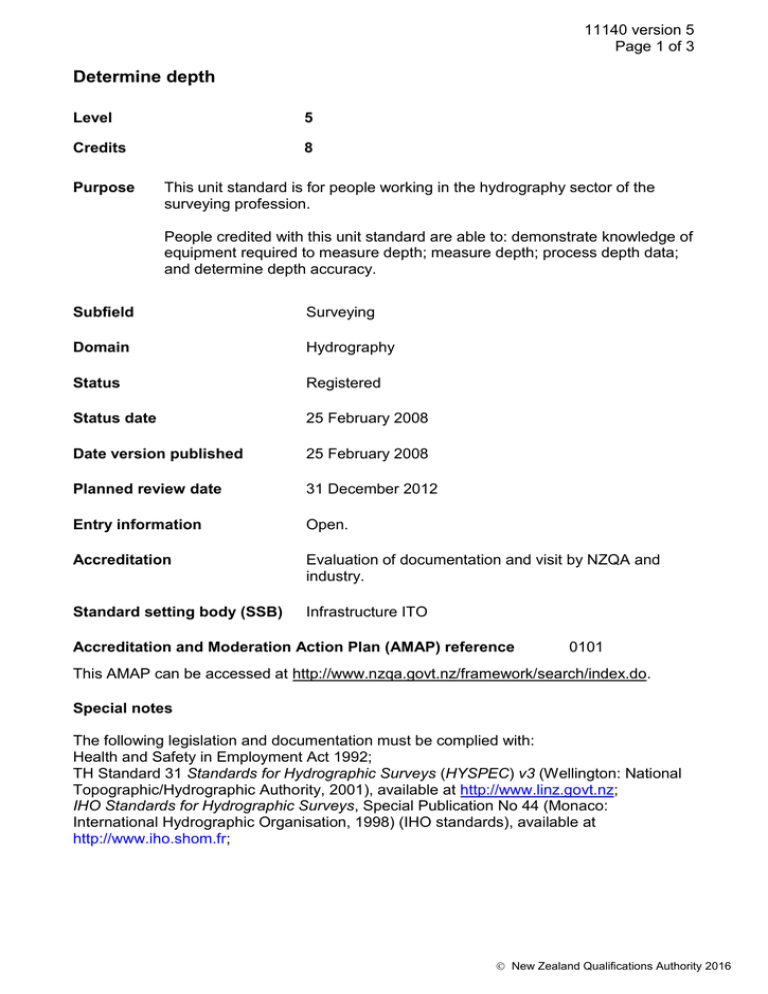
11140 version 5 Page 1 of 3 Determine depth Level 5 Credits 8 Purpose This unit standard is for people working in the hydrography sector of the surveying profession. People credited with this unit standard are able to: demonstrate knowledge of equipment required to measure depth; measure depth; process depth data; and determine depth accuracy. Subfield Surveying Domain Hydrography Status Registered Status date 25 February 2008 Date version published 25 February 2008 Planned review date 31 December 2012 Entry information Open. Accreditation Evaluation of documentation and visit by NZQA and industry. Standard setting body (SSB) Infrastructure ITO Accreditation and Moderation Action Plan (AMAP) reference 0101 This AMAP can be accessed at http://www.nzqa.govt.nz/framework/search/index.do. Special notes The following legislation and documentation must be complied with: Health and Safety in Employment Act 1992; TH Standard 31 Standards for Hydrographic Surveys (HYSPEC) v3 (Wellington: National Topographic/Hydrographic Authority, 2001), available at http://www.linz.govt.nz; IHO Standards for Hydrographic Surveys, Special Publication No 44 (Monaco: International Hydrographic Organisation, 1998) (IHO standards), available at http://www.iho.shom.fr; New Zealand Qualifications Authority 2016 11140 version 5 Page 2 of 3 Guidelines of Good Practice for Hydrographic Surveys in New Zealand Ports and Harbours (Wellington: Maritime Safety Authority of New Zealand, 2004), available at http://www.msa.govt.nz; job specifications; equipment manufacturer’s instructions. Elements and performance criteria Element 1 Demonstrate knowledge of equipment required to measure depth. Range echo sounder – single beam, dual frequency, multi-beam, lead-line, wire sweep, velocity of sound sensors, bar check, sound velocity probe, expendable bathythermograph, motion compensator. Performance criteria 1.1 Operational characteristics of the equipment are identified and described in accordance with manufacturer's instructions. 1.2 Applications and limitations of the equipment are identified in accordance with manufacturer's instructions and principles of acoustic measurement. Element 2 Measure depth. Range echo sounder with or without – velocity sensor, motion sensor. Performance criteria 2.1 Equipment is calibrated in accordance with manufacturer's instructions and HYSPEC. 2.2 Equipment is operated in accordance with manufacturer's instructions and HYSPEC. 2.3 Echo sounder depths are adjusted for velocity of sound and motion in accordance with HYSPEC. Element 3 Process depth data. Performance criteria 3.1 Raw data are interpreted in accordance with HYSPEC and job specifications. Range data includes – depth, velocity, motion compensation. New Zealand Qualifications Authority 2016 11140 version 5 Page 3 of 3 3.2 Depths are corrected to vertical datum by tidal correction in accordance with HYSPEC and job specifications. 3.3 Features and anomalies in depth records are identified in accordance with HYSPEC and job specifications. Element 4 Determine depth accuracy. Performance criteria 4.1 Statistical error budget is compiled, and total depth error is determined in accordance with HYSPEC and job specifications. Please note Providers must be accredited by NZQA, or an inter-institutional body with delegated authority for quality assurance, before they can report credits from assessment against unit standards or deliver courses of study leading to that assessment. Industry Training Organisations must be accredited by NZQA before they can register credits from assessment against unit standards. Accredited providers and Industry Training Organisations assessing against unit standards must engage with the moderation system that applies to those standards. Accreditation requirements and an outline of the moderation system that applies to this standard are outlined in the Accreditation and Moderation Action Plan (AMAP). The AMAP also includes useful information about special requirements for organisations wishing to develop education and training programmes, such as minimum qualifications for tutors and assessors, and special resource requirements. Comments on this unit standard Please contact Infrastructure ITO askus@infratrain.co.nz if you wish to suggest changes to the content of this unit standard. New Zealand Qualifications Authority 2016
